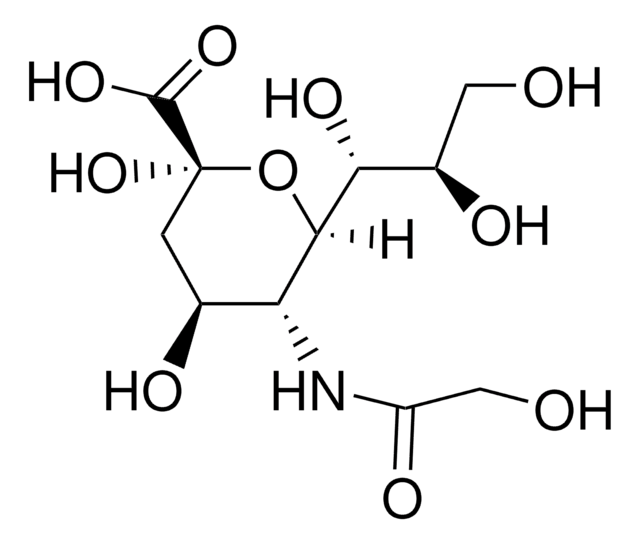50644
N-Glycolylneuraminic acid
≥95% (HPLC)
Synonym(s):
Neu5Glc, NeuNGl
Sign Into View Organizational & Contract Pricing
All Photos(1)
About This Item
Empirical Formula (Hill Notation):
C11H19NO10
CAS Number:
Molecular Weight:
325.27
Beilstein:
1716828
MDL number:
UNSPSC Code:
12352201
PubChem Substance ID:
Recommended Products
biological source
synthetic
Quality Level
Assay
≥95% (HPLC)
form
powder
storage temp.
−20°C
SMILES string
[H][C@]1(O[C@@](O)(C[C@H](O)[C@H]1NC(=O)CO)C(O)=O)[C@H](O)[C@H](O)CO
InChI
1S/C11H19NO10/c13-2-5(16)8(18)9-7(12-6(17)3-14)4(15)1-11(21,22-9)10(19)20/h4-5,7-9,13-16,18,21H,1-3H2,(H,12,17)(H,19,20)/t4-,5+,7+,8+,9+,11-/m0/s1
InChI key
FDJKUWYYUZCUJX-AJKRCSPLSA-N
Looking for similar products? Visit Product Comparison Guide
Application
Glycolylneuraminic acid, a component of non-human milk and colostrums, is used as a reference to analyse changes of the glycome during lactation. Glycolylneuraminic acid, a xenoantigen, is involved in antigenic reactions (antibody-mediated hyperacute rejection) during xenotransplantion.
Other Notes
To gain a comprehensive understanding of our extensive range of Monosaccharides for your research, we encourage you to visit our Carbohydrates Category page.
Regulation of N-glycolylneuraminic acid biosynthesis in rat and mouse liver
Sales restrictions may apply
Storage Class Code
11 - Combustible Solids
WGK
WGK 3
Flash Point(F)
Not applicable
Flash Point(C)
Not applicable
Personal Protective Equipment
dust mask type N95 (US), Eyeshields, Gloves
Choose from one of the most recent versions:
Already Own This Product?
Find documentation for the products that you have recently purchased in the Document Library.
Customers Also Viewed
A Lepers et al.
European journal of biochemistry, 193(3), 715-723 (1990-11-13)
The relative contribution of N-glycoloyl-beta-D-neuraminic acid (Neu5Gc) to total sialic acids expressed in mouse and rat liver glycoconjugates was found to be 95% and 11%, respectively. This considerable difference in sialic acid composition made these two tissues suitable models for
Xing Yu et al.
Journal of virology, 86(24), 13456-13466 (2012-10-05)
The rotavirus spike protein domain VP8* is essential for recognition of cell surface carbohydrate receptors, notably those incorporating N-acylneuraminic acids (members of the sialic acid family). N-Acetylneuraminic acids occur naturally in both animals and humans, whereas N-glycolylneuraminic acids are acquired
Nobuyoshi Hayashi et al.
Cancer science, 104(1), 43-47 (2012-09-26)
Gangliosides are glycosphingolipids found on the cell surface. They act as recognition molecules or signal modulators and regulate cell proliferation and differentiation. N-glycolylneuraminic acid (NeuGc)-containing gangliosides have been detected in some neoplasms in humans, although they are usually absent in
Rachel E Taylor et al.
The Journal of experimental medicine, 207(8), 1637-1646 (2010-07-14)
The nonhuman sialic acid N-glycolylneuraminic acid (Neu5Gc) is metabolically incorporated into human tissues from certain mammalian-derived foods, and this occurs in the face of an anti-Neu5Gc "xeno-autoantibody" response. Given evidence that this process contributes to chronic inflammation in some diseases
Potential impact of the non-human sialic acid N-glycolylneuraminic acid on transplant rejection risk.
Vered Padler-Karavani et al.
Xenotransplantation, 18(1), 1-5 (2011-02-24)
Our team of scientists has experience in all areas of research including Life Science, Material Science, Chemical Synthesis, Chromatography, Analytical and many others.
Contact Technical Service









